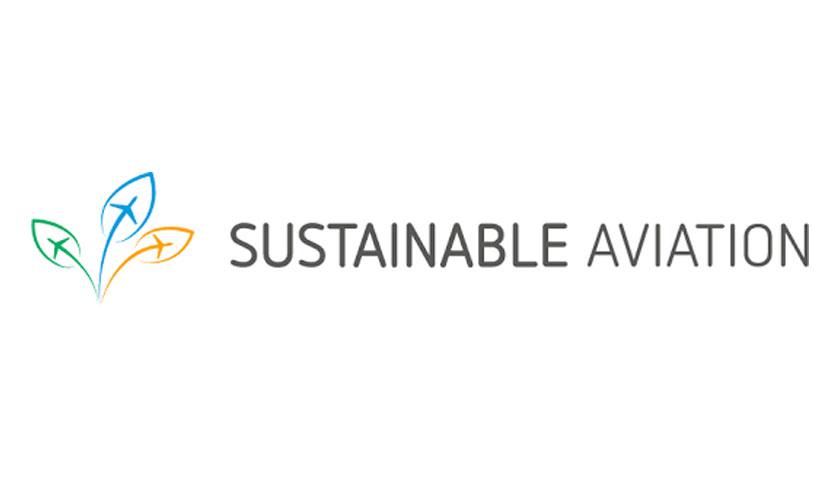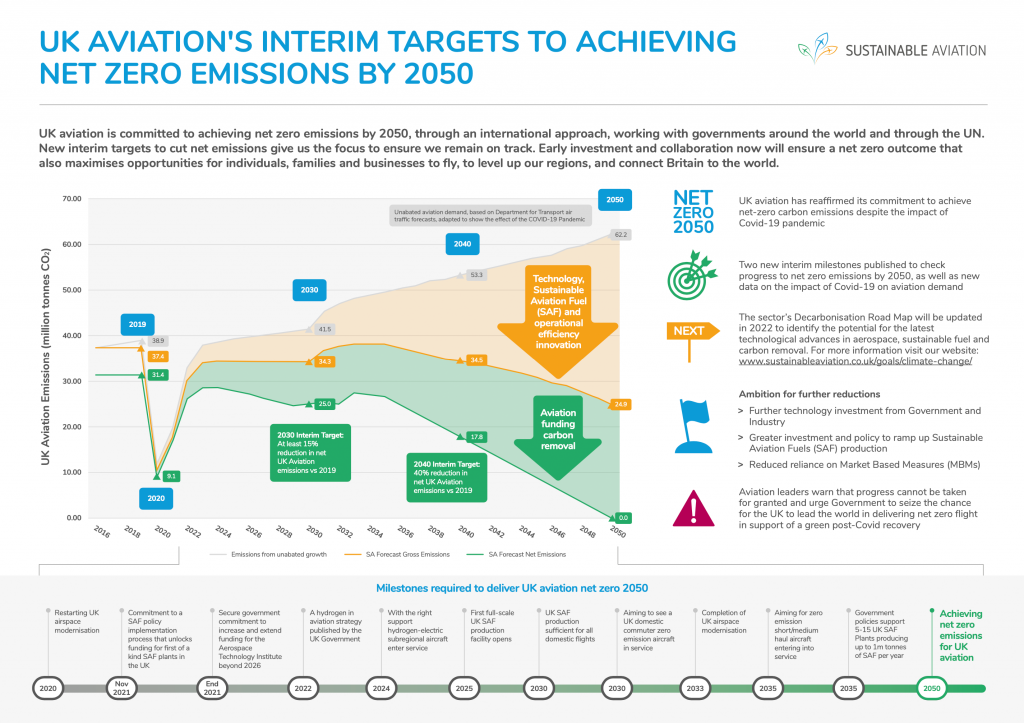The UK’s leading airlines, airports, aerospace manufacturers and air service navigation providers have reaffirmed their joint commitment to a net-zero future for UK aviation, setting out a first set of interim decarbonisation targets that will act as milestones on the path to net-zero aviation by 2050.
Industry is targeting at least an overall 15% reduction in net emissions relative to 2019 by 2030, and a 40% net reduction by 2040, with the pace of decarbonisation ramping up as game-changing sustainable aviation fuels (SAF), permanent carbon removal, and new low and zero-carbon technologies – such as electric and hydrogen-powered aircraft – become mainstream in the 2030s.
These milestones are reflected on a new chart taking account of the effects of Covid-19 on aviation demand and complement an ever-growing set of voluntary industry pledges to drive down emissions fast. Importantly, today’s announcement also kickstarts detailed work to update by the middle of next year the sector’s Decarbonisation Road Map, first published in 2020, that is expected to demonstrate even faster potential to decarbonise aviation through technology innovation.
Decarbonising aviation is a huge challenge, with significant technology and policy barriers that need to be overcome this decade. With the right support, it can and will be achieved, maintaining the major economic and social benefits of the UK’s air links to the world, and generating new opportunities for tomorrow’s engineers through highly skilled green aviation jobs. However, the UK risks falling behind as other countries including the United States put in place enhanced policies to support innovation and new fuel technologies.
To make sure UK aviation continues to lead the world in aviation decarbonisation, further support is needed in five areas critical to realising net-zero flight:
- Key policies this year to deliver a UK SAF industry and commercialise SAF, most urgently by providing a demand signal and price support – the primer for up to 14 UK plants generating sustainable fuel from household and industrial waste by the middle 2030s, supporting at least a 32% reduction in emissions from UK aviation by 2050;
- A positive, long-term signal for investment in aerospace technology and the development of hybrid, electric and hydrogen-powered aircraft through increased and extended funding for the Aerospace Technology Institute;
- The completion of vital airspace modernisation generating significant carbon savings through more efficient flying and shorter journey times;
- Policies that incentivise the commercialisation of carbon removal technologies that enable carbon neutral or carbon negative aviation fuel, allowing the aviation industry to address any remaining residual emissions;
- UK Government to seek a more robust international commitment for aviation carbon reduction at the ICAO Assembly in 2022, ensuring emissions are reduced across the globe and not exported from the UK.
Secretary of State for Transport Grant Shapps MP said in response:
“As the first major economy in the world to commit to net-zero by 2050, we are leading the charge to cut aviation emissions through the Jet Zero Council.
“The commitment shown here by industry today builds on that work, embodying the forward-thinking attitude we need to decarbonise the sector and put the UK at the forefront of green aviation.”
Commenting on the launch of these targets, Secretary of State for Business, Energy, and Industry Strategy Kwasi Kwarteng MP said:
“These targets are an important milestone for the British aviation industry and show that airports, aerospace manufacturers and airlines share in our ambition to adopt the new and emerging technologies necessary to fight climate change.
“Working with industry through our Jet Zero Council, we are putting the decarbonisation of the aviation sector at the centre of our plans to build back greener from the pandemic and this industry roadmap complements our vision perfectly.”
Chair of Sustainable Aviation Adam Morton said:
“UK aviation led the world last year by being the first national aviation body in the world to commit to net zero by 2050. We are now raising the bar by committing to additional interim milestones to hold ourselves accountable on this journey to Jet Zero.
“This is ambitious but achievable, and requires meaningful cooperation between industry and Government, as well as the necessary policies and funding to ensure the UK can build a world-leading SAF industry, create new clean aircraft, and modernise British airspace.”
- Sean Doyle, CEO, British Airways, said:
“We fully support this important commitment to 2030 and 2040 carbon reduction targets demonstrating that as an industry we are taking action now to reduce our carbon emissions and put us on the pathway to our ultimate ambition of Net Zero Emissions by 2050” - Kevin Craven, Chief Executive, ADS said:
“The UK’s aerospace manufacturers are deeply committed to achieving net zero aviation and being world leaders in delivering the advanced green technologies that will make this ambition a reality.“Our members are investing heavily in innovative R&D projects focussed on driving down carbon emissions, by boosting fuel efficiency in the aircraft of today and creating the radical new propulsion systems and components that will drive the aircraft of tomorrow.
“We are working closely with Government and the Jet Zero Council to make sure UK industry plays a major role in delivering net zero aviation by 2050, meeting our national environmental commitments and enhancing our prosperity.”
-
Karen Dee, Chief Executive at Airport Operators Association, said:
“Despite the impact of the Covid-19 crisis, airports remain committed to tackling the climate crisis. As the AOA set out in our Airport Recovery Plan, we can and must return to 2019 passenger levels without 2019 environmental impacts. Airports will play their part in achieving the goals set out by Sustainable Aviation today, including by modernising UK airspace to reduce noise and climate impacts, ensuring airport infrastructure is ready for sustainable aviation fuels and reducing ground-based emissions of buildings and vehicles operating on and around airports.”




